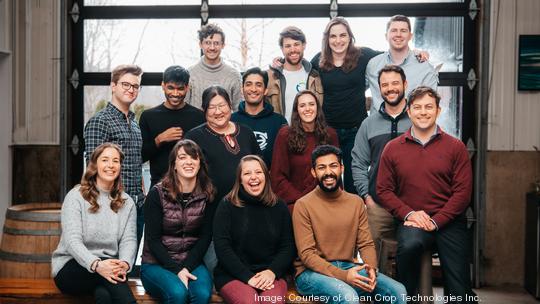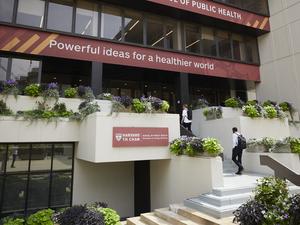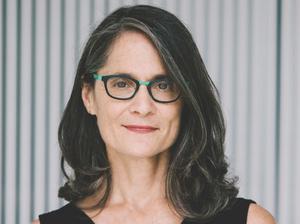
Most mornings, Julie Bliss Mullen packs up her car and drives from her home in the Central Massachusetts town of Oxford to Hampshire County's Hadley, a town of around 5,000 people. For five years, Western Massachusetts — and the Pioneer Valley, specifically — has been the home of Aclarity LLC, a water-treatment company she co-founded after her Ph.D. program at UMass Amherst.
But on one morning in late March, she was driving toward Framingham to interview a job candidate. Spending her workdays outside of Western Massachusetts will soon become her new normal: Aclarity is planning a move to a new headquarters around Worcester.
“I don’t mean to be really negative, (but) it’s been a huge, huge challenge to be located out in Western Mass.,” Bliss Mullen said.
Finding talent far from the tech hub in and around Boston has been her biggest challenge, Bliss Mullen said. It's the primary reason for the company’s move. But she has also dealt with challenges accessing strategic venture capitalists and a lack of local mentors. The less expensive real estate in Hadley isn’t enough to persuade her to stay.
“Now we’re expanding, and the majority of the hires are around Central Mass. and in closer to Boston, so we’re moving a little bit closer this way,” Bliss Mullen said.
Entrepreneurs and economic development officials have tried for years to build a startup ecosystem in Western Massachusetts. Some are succeeding, raising venture capital and scaling up like any Boston-based company.
But founders and industry experts who spoke to BostInno said such success is despite the additional hurdles in their path, including that more-limited talent pool and lack of networking opportunities. To fill that gap, local organizations are springing up to support startups in Western Massachusetts.
Finding talent is hard. Keeping them, less so.
While Bliss Mullen has struggled to find engineering talent from local universities willing to stick around after graduation, Daniel White, CEO and co-founder of Holyoke-based Clean Crop Technologies Inc., said he’s had success recruiting people nationally to fill key roles. The agricultural tech company’s chief technology officer came from Greater Philadelphia.
White said it might take longer to recruit the right person for roles in Western Massachusetts, given the smaller talent pool or relocation decisions. However, he believes it’s easier to retain employees because there are fewer competing companies. For his 15-full time employees, White said the cost of living and quality of life in Western Massachusetts were big draws.
More space also means lower building and rental costs for companies. Clean Crop pays around $10 a square foot for its 10,000-square-foot space, White said.
“For a hardware-first company like us that needs to be able to scale quickly, a huge part of why we’ve been able to make the progress we have is that once we hit a point where we need to build a bigger prototype, we can just rent more space without it breaking the bank,” White said.
Networking: Extra work, road trips
When White wants to meet with investors, it’s not as simple as walking to a neighboring office in Kendall Square: He must plan two to three meetings on a given day, then make the 90-minute drive to Boston.
White doesn’t think the company has missed out on any funding opportunities yet due to its location. Clean Crop raised a $3 million seed round in 2020 and another $6 million in a Series A earlier this year. He said there’s a difference between being in Western Massachusetts compared to, say, rural Nebraska.
However, Clean Crop is one of just a handful of Western Massachusetts companies to raise venture capital in recent years. In 2021, just nine venture-funded deals were secured by companies in Berkshire, Franklin, Hampden and Hampshire counties, according to a BostInno analysis of Crunchbase data. Companies statewide secured 1,008 deals amounting to $34.7 billion. (Crunchbase noted that some deals do not disclose the funding amount, including for several deals in Western Massachusetts).
Boston took the top spot, with 458 deals in the city, with Cambridge at 219 and Waltham at 37 rounding out the top three.
In 2021, MassVentures, the state's venture capital fund, made a stock purchase in Northampton-based Machine Metrics and awarded a grant to Aclarity. Around 43 additional investments in startups that year went to companies outside of Berkshire, Franklin, Hampden and Hampshire counties. Earlier this year, MassVentures said it also participated in Aclarity's $3.3 million seed round. In 2020, the fund issued a convertible note to Machine Metrics.
Bliss Mullen also found herself making road trips to Boston for meetings with venture capitalists. She spoke candidly about the company’s first fundraising in 2019, calling the experience frustrating and the terms of the deal “not good.”
She thinks Aclarity missed out on some opportunities because it was not located in a tech hub. If the company was at a place like Greentown Labs in Somerville, she believes she would have regularly run into venture capitalists and have more networking opportunities.
“We would have excelled a lot faster. We would’ve gotten better terms. We probably would have had more strategic investors,” Bliss Mullen said.
Bliss Mullen said Chris Sims, a partner in The Alchemy Fund, is one of the few investors who prioritizes Western Massachusetts startups and works with them along their journey. The Alchemy Fund invests in national-quality, New England-based startups located outside of Boston.
Sims said the fund has invested in 13 Western Massachusetts projects in his nearly five years with Alchemy.
While other firms have tried to work with startups in Western Massachusetts, Sims said they often struggle to interact with founders. In this small startup community, Sims said there are fewer mentors to help founders navigate processes like building a venture-quality pitch deck and networking. These founders may need more support from investors to build, but that doesn’t mean they aren’t worth the investment, Sims said.
“It doesn’t mean that the projects are any worse,” Sims said. “But there’s a specific type of sophistication that comes with being around other people.”
The pandemic has been an equalizer for many Western Massachusetts startups, Bliss Mullen and White both said. As networking events and meetings went online, fewer firms cared where companies were located. Aclarity raised a $3.3 million seed round in mid-April, and Bliss Mullen said her investors came from across the country. She didn’t need to fly to meet them in person, and they rarely asked where in Massachusetts she was located.
“I don’t think it’s ever going to go back to as in-person as things were in the past,” she said. “Which is a good thing for startups that are not in real hot spots for innovation and resources.”
West-East connections
Ben Schwartz thinks the missing link between Eastern Massachusetts and Western Massachusetts comes down to one thing: communication. He is the president of Flooid Power Systems Inc., an Easthampton-based company developing a heat-pump system to capture the sun’s heat and convert it into electricity at utility scale.
Schwartz said he wants to see a pipeline to connect companies in Western Massachusetts to investors, resources and partners in the other half of the state. Flooid is looking to build relationships with Eastern Massachusetts–based solar-energy companies as potential joint-venture partners.
“There are a lot of really promising companies here and they have to make the effort to reach out to the decision-makers and corporate operators in Eastern Massachusetts. And it doesn’t necessarily seem to be a two-way street,” Schwartz said. “(Those in Eastern Massachusetts) do have more resources. And if they were more proactive in building those relationships with companies that have aligned interests and capabilities, it would be money well spent.”
State Sen. Eric Lesser, chair of the Committee on Economic Development and Emerging Technologies, said there have been efforts to boost the tech ecosystem in Western Massachusetts. These include funding Valley Venture Mentors in Springfield and establishing a program to research opportunities in high-growth industries like robotics and fintech.
Lesser said one big missing piece is the physical connectivity of the region. He has been a vocal proponent of building an East-West rail system — a proposal that just took a big step forward.
“You can imagine a future where Springfield has multiple trains a day going back and forth between New York City and multiple trains a day going back and forth between Boston,” Lesser said. “I think you would certainly see a cluster emerge at that point because it would be in between two of the biggest tech centers in the world.”
Startup resources
Valley Ventures Mentors, a nonprofit supporting early-stage startups, is just one of several programs dedicated to Western Massachusetts companies. Others include the Berkshire Innovation Center, the Kayon Accelerator, Spark EforAll Holyoke and the UMass Amherst Innovation Institute.
UMass Amherst’s 2018 purchase of Mount Ida College in Newton was a controversial effort to connect the campus’ students with Boston-area employers. The move was criticized by UMass Boston faculty, who felt they were being forced to compete with the new campus over students, instructors and resources. In 2021 the Mount Ida campus announced it was opening co-working space for startup or small companies interested in co-locating with the state’s public research university.
Somerville-based Forge, which operates a Pioneer Valley office, is a nonprofit that helps founders navigate the journey from physical prototype to commercialization. It has worked with 60 startups in its Pioneer Valley location.
Kevin Moforte, the Western Massachusetts director for Forge, said there is a great deal of collaboration among the programs and universities supporting Western Massachusetts companies. Forge has also been piloting a founders’ network with the Western MA Economic Development Council, Valley Venture Mentors and the Berkshire Innovation Center to build the connectivity in a region lacking a central tech hub. Founders of similar-stage startups are paired with peers and mentors.
“They’ve been able to kind of strengthen and increase the stickiness of the ecosystem,” Moforte said.
Moforte said Western Massachusetts is becoming a better place for startups to grow with its ever-expanding resources, research and talent from local universities, as well as the lower cost of land. He just wishes there was more visibility for the companies growing in Western Massachusetts and the region that’s producing them.
“Success draws success, and I feel like sometimes it just flies under the radar,” Moforte said. “Western Mass. is a particularly attractive place for startups looking for a home base to set up and validate their ideas and begin the process to scale."








